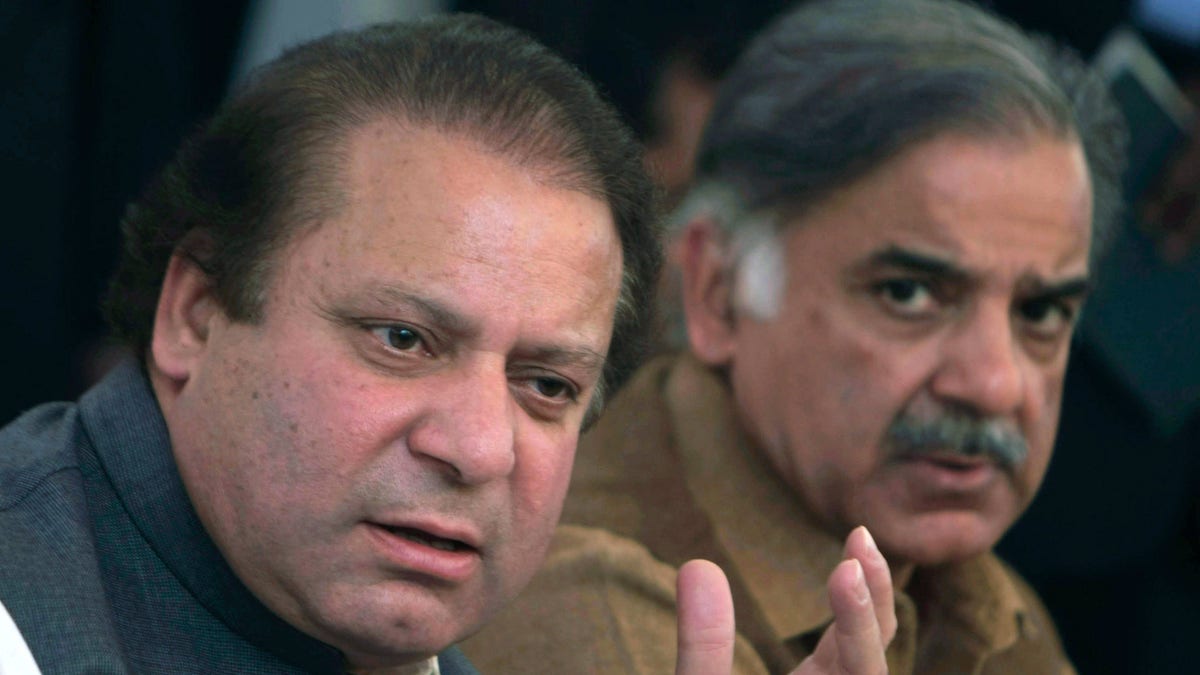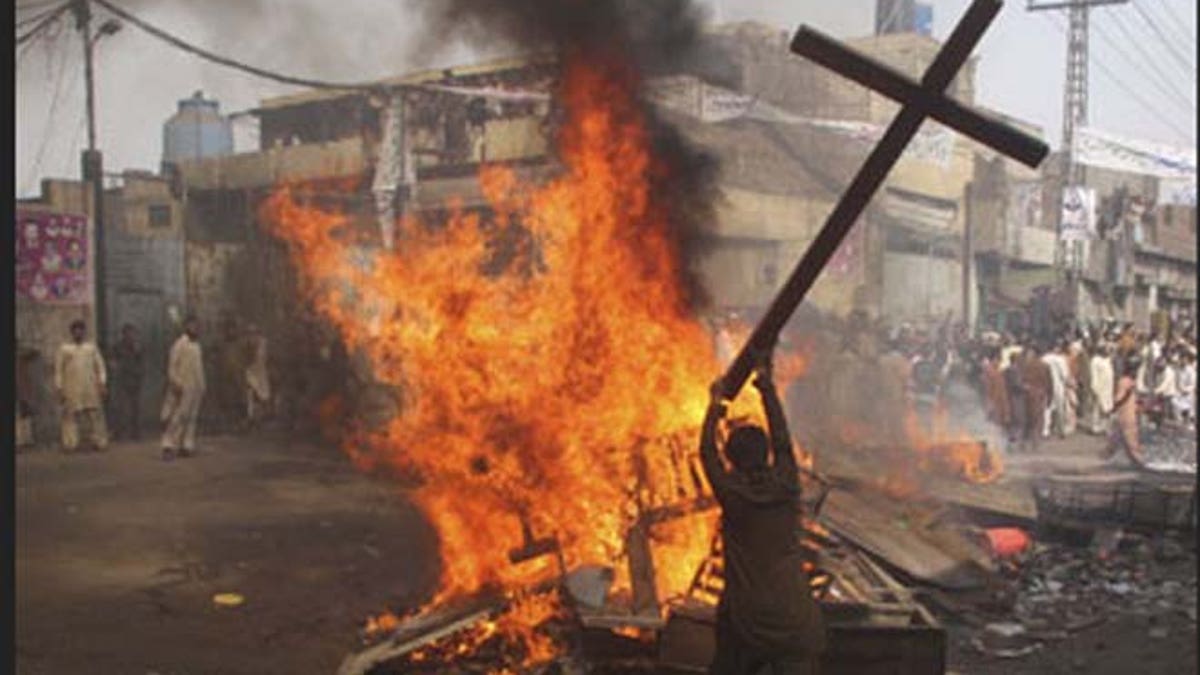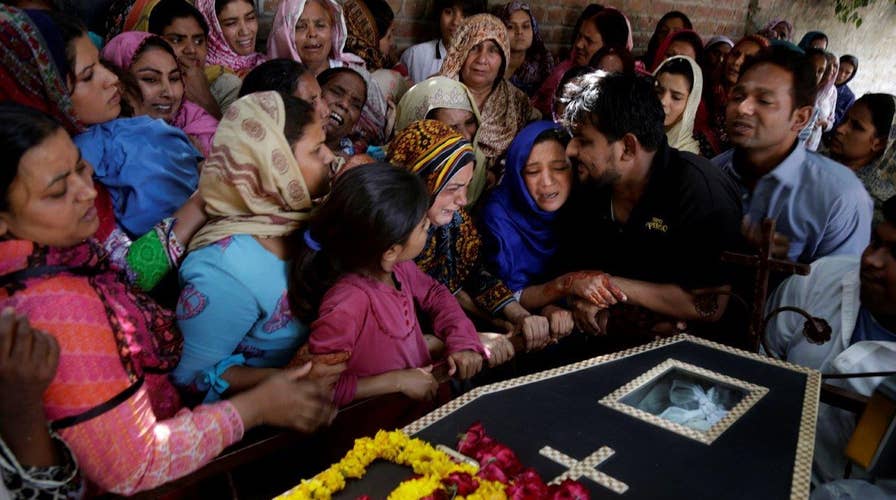The U.S. must condition billions of dollars in foreign aid doled out to Pakistan to the Muslim-majority nation taking serious steps to quelling rampant persecution of Christians and other minorities, say advocates.
Persecution of Christians in Pakistan is on the rise, with high-profile attacks on churches and gatherings and faith-driven prosecutions, say fath-based and immigrant groups in the U.S. They want the U.S. to demand better from Pakistan in exchange for the billions in foreign aid American taxpayers send to Islamabad.
"The U.S must make protection of religious minorities a higher priority in its relations with Pakistan,” Lisa Curtis, senior research fellow at the Heritage Foundation, told FoxNews.com. “Upholding religious freedom is not only important as a human rights issue, but also as a strategic and security issue since it is directly linked to the broader trend of growing Islamic extremism."
Muslims make up more than 95 percent of Pakistan's population of 185 million. Christians comprise roughly 2 percent and Hindus and other groups the rest. Thursday marks the nation's "National Minority Day."

Pakistan's Prime Minister Nawaz Sharif, left, shown with his brother, Shahbaz Sharif, has pledged to protect religious minorities. (Associated Press)
Curtis was part of a group of national security and foreign policy experts who last year pressed President Obama in vain to make attacks against religious minorities a key topic of talks between President Obama and Pakistani Prime Minister Nawaz Sharif last year. The U.S. Commission on International Religious Freedom (USCIRF) has also repeatedly recommended that the U.S. designate Pakistan a "Country of Particular Concern," which would allow Washington to put direct pressure on Islamabad to undertake reforms.
The Rev. Thomas Reese, who is commission chairman, said the State Department won’t say why it has resisted addressing rampant and government-abided persecution of Christians.
"The forces that target religious minorities and members of the majority faith present a human rights and security challenge to Pakistan and the United States," he said.

Pakistani man is shown burning a cross. (Reuters)
It is not just Christians who are persecuted in Pakistan, said Hassan Abbas, professor of international security studies at the National Defense University in Washington and author of "The Taliban Revival."
"Hindus, Sikhs and even minority groups within Islam have faced increased violence and terror,” he said. “Ethnic minorities, too, have severe grievances.”
A State Department official told FoxNews.com that they “regularly express their concerns to Pakistani authorities about the state of religious freedom,” but that Secretary of State John Kerry determined in April that Pakistan’s behavior did not warrant the damning designation because the nation had made progress in addressing the issue. Islamabad has closed hundreds of Islamist schools where hate was preached and has cracked down on violent sectarian groups, the official said.
But U.S.-based advocates point to events that show persecution of Christians is rising. Among them:
- In March, a suicide bomber from Jamaat ul-Ahrar, an offshoot of the Taliban, killed more than 70 – many of them children – and injured more than 300 in an attack during an Easter celebration in a Lahore park.
- Last year, suicide bombings outside two churches in Lahore left dozens killed or wounded.
- A 15-year-old boy was burned to death in April 2015, after admitting he was a Christian to two Muslim men; two gunmen opened fire on children at a Lahore Catholic School, injuring two security guards and a student.
- In March 2013, dozens of Christian homes were set on fire by angry Muslims after a Christian man allegedly insulted Mohammad.
- Christian leaders claim to have received death threats for their role in the construction of new churches and refusal to convert to Islam.
Madeeha Bakhsh, of the online newswire Christians in Pakistan, said Muslim extremist violence against Christian girls and women is exploding in poor neighborhoods. An estimated 700 Christians were compelled to convert to Islam last year, many as part of forced marriages.
"Christian girls – married and unmarried – are being abducted, sexually abused and almost at all times subjected to forced conversions by means of forced marriages with Muslims," he said. "Since Pakistan relies heavily on foreign aid, first and foremost, terms tied to funding would trigger a state-backed drive against the religion-based persecution. But there is very little being done."
Advocacy on behalf of Pakistan’s religious minorities from within the nation is dangerous, as those who speak out are silenced with accusations of blasphemy and even imprisonment. The closest thing religious minorities have to a political advocate may be the Muttahida Qaumi Movement, a Karachi-based political party originally comprised of those who fled India.
“Sadly, minorities are not accepted as true Pakistanis,” said Nadeem Nusrat, who lives in London and serves as top aide to MQM leader Altaf Hussain. “We would like a system more like you have in the West. We see the U.S. as a national ally to the people of Karachi. We see our values, to accept all groups, as similar.”
The MQM, despite being a mostly secular party, has long been accused of using violence and intimidation as a means to maintain control of Karachi, which its leadership denies and attributes to a smear campaign. Hussain has been in self-imposed exile since 1992 over money-laundering allegations and murder accusations that he and his supporters deny.
Nadeem Hotiana, a spokesperson for the Pakistani Embassy in Washington, said the government is committed to protecting minorities. He noted Sharif recently announced that religious holidays of minority communities such as Easter will be declared national holidays and that there are guaranteed seats reserved for minorities in the national and provincial assemblies, as well as the Senate.
“The Constitution of Pakistan guarantees equal rights to all minorities and freedom to practice their religious beliefs,” he said. “Minorities are free to profess their religion and visit their places of worship.”
Yet, many remain unconvinced and say true change can only be driven by pressure from the U.S.
"Progress can take time, but our leaders must continue to pursue improvement for the plight of persecuted Christians and other religious minorities,” said David Curry, president and CEO of Open Doors USA, which advocates for persecuted Christians across the world.









































